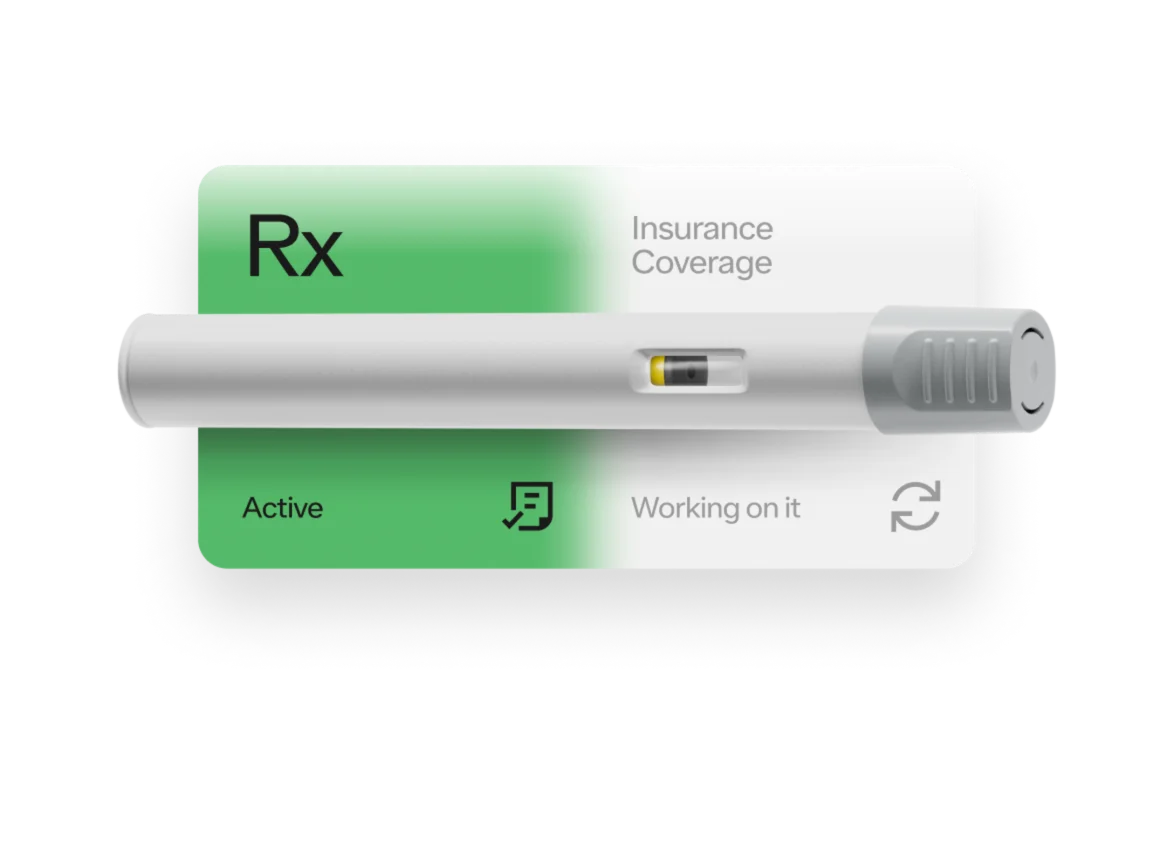Key takeaways
There can be a number of reasons why you’re still hungry on semaglutide, including feeling stressed, not getting enough sleep, and simply needing to give the medication more time.
Semaglutide helps with weight loss by reducing hunger and food cravings, but it doesn’t completely eliminate hunger.
By making changes to your diet, incorporating more exercise, and prioritizing your sleep and mental health, you can take steps to be more in tune with your body and what it needs.
Here's what we'll cover
Key takeaways
There can be a number of reasons why you’re still hungry on semaglutide, including feeling stressed, not getting enough sleep, and simply needing to give the medication more time.
Semaglutide helps with weight loss by reducing hunger and food cravings, but it doesn’t completely eliminate hunger.
By making changes to your diet, incorporating more exercise, and prioritizing your sleep and mental health, you can take steps to be more in tune with your body and what it needs.
Semaglutide is the active ingredient in Ozempic, Rybelsus, and Wegovy—and many people expect it to completely take away their appetite. You may still be hungry on semaglutide and wonder if it’s normal.
The short answer is, yes, it’s common for people to feel hungry on semaglutide.
Semaglutide is a prescription medication that may be prescribed for weight loss (Wegovy) or type 2 diabetes (Ozempic, Rybelsus). Ozempic and Rybelsus can also be prescribed off-label for weight loss.
Semaglutide helps control blood sugar levels and reduces appetite and cravings—which can lead to weight loss. It’s normal to feel hungry on semaglutide, but appetite changes take time and aren’t the same for everyone—and there are a few reasons why.
Why am I still hungry on semaglutide?
There are several reasons you may still feel hungry while taking semaglutide. Semaglutide works by curbing your hunger and slowing down digestion, so you feel full sooner when you eat and stay feeling that way longer. While it’s not considered an appetite suppressant like older weight loss drugs, semaglutide helps reduce appetite, meaning you won’t feel as hungry while you’re taking it.
There are several reasons why this happens.
Hunger won’t totally disappear on semaglutide
Your hunger won’t completely disappear on semaglutide. Hunger is how your brain and stomach tell each other that it’s time to eat and get the energy and nutrients your body needs. While you’ll still feel hungry, you may notice that your thoughts about food have changed. “Food noise” describes those persistent, obsessive thoughts around food that can make it feel like all you’re thinking about is food.
Semaglutide works by mimicking glucagon-like peptide 1 (GLP-1), a gut hormone involved in managing your appetite and blood sugar levels. When you take a GLP-1 medication like semaglutide, you tend to feel full sooner and don’t have the same cravings for food you once did. For instance, you might feel like you no longer crave super-sweet or high-calorie foods. And walking past a favorite restaurant or favorite foods in a commercial doesn’t hold the same appeal it used to.
You may need to give it a bit more time
Treatment with semaglutide medications like Wegovy and Ozempic start with a low dose that gradually increases over time. Usually, the dose goes up every four weeks or so until you reach a dose that’s right for you, known as a maintenance dose. This process can take 12–16 weeks for Ozempic and 16–20 weeks for Wegovy.
This is to decrease the risk of semaglutide’s side effects while your body gets used to the medication. However, this ramp-up period also means it will take longer for you to experience the full effectiveness, including reduced hunger. You may find that the lower doses of the medications don’t affect your appetite as much as the higher doses do.
You may need a higher dosage of semaglutide
“Some people initially experience a total absence of hunger [on semaglutide],” says Lauren Harris-Pincus, MS, RDN, and Dietitian Advisor for Ro. “Others may need higher doses to experience a significant change in hunger levels.”
The recommended maintenance dosage for Wegovy is 1.7 or 2.4 mg weekly, though depending on how people react to it, some people are maintained at a lower dose. The maintenance dosage for Ozempic can be 1 mg or 2 mg weekly, though some people are maintained on 0.5 mg. Again, it all depends on your body and goals for managing type 2 diabetes or weight loss. If you are taking a lower dosage than that and still feeling hungry, check in with your healthcare provider. A higher dosage could be more effective for you.
“Each body is different, and it’s important to work with your provider to find optimal dosing for you,” Harris-Pincus says. (Remember, your goal isn’t to have no hunger whatsoever, because hunger is an important way your body tells you it needs more fuel.)
You’re eating less
Semaglutide is most effective when combined with a reduced-calorie diet and regular exercise. You may have started practicing portion control or reduced your food intake.
If you just recently started eating less, it’s normal to feel hungry. Over time, your body should adjust to your new calorie intake. Make sure you’re eating nutritious foods that make you feel more full, like fiber and protein—which we’ll cover in our next point.
Note: Semaglutide should be combined with lifestyle changes like a lower-calorie diet. However, you want to ensure that you’re still getting enough nutrients. If you’re still feeling hungry, consulting a dietitian can be helpful to ensure you’re following a balanced diet.
You’re eating less filling foods
“It’s wise to evaluate diet and lifestyle factors before assuming you need more meds or that they are not working,” Harris-Pincus says. Semaglutide is most effective when it’s combined with diet and exercise. If you haven’t adjusted your diet since starting semaglutide, now may be a good time to make changes.
Foods with “empty calories”—essentially, foods that pack in the calories but offer little nutritional value—can leave you feeling unsatisfied and craving more. This is especially true for ultra-processed foods high in sugar and unhealthy fats, which are designed to be highly addictive. Instead, Harris-Pincus advises focusing on meals high in protein and fiber.
You’re not getting enough sleep
It might seem surprising, but what happens while you sleep can affect how hungry you feel. When you don’t get a good night’s sleep on a regular basis, it can cause your hunger hormone, ghrelin, to increase. At the same time, it can also cause leptin—the hormone that signals you’re full—to decrease. This means you may feel hungrier and not feel as full after eating.
Research suggests that people who don’t get enough sleep tend to snack more, especially at night, and on higher-calorie meals. Research shows that regularly getting less than six hours of sleep per night is linked to a 45% increased risk of obesity.
If you’re taking semaglutide and having trouble sleeping, talk with your healthcare provider about your sleep issues. Getting better sleep can help your hunger levels.
You’re under a lot of stress
If you’re dealing with a lot of emotions, you might find yourself still craving food on semaglutide—even if you’re not actually hungry. Eating is a common coping strategy people use to deal with stress, depression, or anxiety. This is known as emotional eating or stress eating, and is often done in response to feelings, as opposed to hunger.
People who use stress eating as a coping strategy tend to turn to less healthy foods—such as sweets, fast foods, and cereal. This means they’re more likely to feel hungry and want to eat more. At the same time, you may be less likely to eat foods that satisfy your hunger, such as fiber- and vitamin-rich foods.
Emotional eating is also linked to poor sleep, which can affect your stress and create a vicious cycle of hunger.
What to do if you’re still hungry on semaglutide?
If you’re still hungry on semaglutide, consider these tips for reducing hunger and increasing satiety.
Revamp your diet
When it comes to beating hunger on semaglutide, reevaluating your diet is an important first step, according to Harris-Pincus. Your provider or a registered dietitian can help with your dietary needs and recommend the amount of protein and fiber you should be consuming daily. “Many people who experience hunger later in the day are not consuming an adequate protein- and fiber-filled breakfast. It can make all the difference.”
Here are some ways you can revamp your diet on semaglutide:
Focus on fiber-rich foods: Foods high in fiber include fruits, vegetables, and whole grains. They’re not only nutritious, but they can help reduce your hunger. Harris-Pincus recommends getting at least 25 grams of fiber every day.
Eat more protein: Protein is a macronutrient that makes you feel full, and can lead to less hunger. Think meat, eggs, dairy and quinoa. Harris-Pincus says to aim for at least 25 grams of protein for meals.
Prioritize nutritious snacks: Try to limit processed foods and reach for more whole foods like edamame, nuts and seeds, yogurt, and string cheese. These foods have more protein and fiber, which helps keep you feeling full.
Don’t forget to hydrate: Be sure to drink plenty of water throughout the day. In addition to being good for your overall health and ensuring your organs are working like they should, water can also help you feel more full.
Make exercise a regular habit
Exercise not only burns calories but can also temporarily suppress appetite.
Overall, though, you might feel hungrier when you first start increasing your daily physical activity. But studies show that once you have a regular workout routine, your body adjusts your appetite to how much you really need to eat to feel full. Aerobic exercises like running and biking, and resistance exercises like yoga and weight-lifting, have this effect.
Take care of your mental health
When emotional eating becomes a habit, your brain learns to pair certain emotions with eating. Working with a therapist can help you break those patterns and develop healthier coping mechanisms instead. Strategies that can be helpful in curbing emotional eating and relieving stress include:
Mindfulness meditation: Practicing mindfulness meditation is about living in the moment—paying attention to your surroundings, such as noticing smells, noises, and sights around you.
Cognitive behavioral therapy (CBT): CBT is a type of therapy that’s done with a trained professional who teaches you how to cope with emotions in a healthier way.
Lifestyle changes: Improving sleep and being more active can help improve your mental health.
If you are feeling stressed, anxious, or depressed (or maybe a bit of all three), getting help can make you feel better and less hungry.
Improve your sleep
If you’re sleeping six hours or less a night, improving your sleep can make a positive difference in your hunger levels. Not only can better sleep help you feel less hungry, it can also reduce your stress. Feeling less stressed can also help you feel less hungry and less inclined to reach for food as a comfort. Aim for seven to nine hours of sleep each night.
Be patient
If you're just getting started on semaglutide, know that it can take time to reach maintenance doses and feel the full effects. This can mean up to 12–20 weeks, depending on whether you’re taking Ozempic vs. Wegovy. In the meantime, keep taking your medication as prescribed.
If you’ve already reached the maximum dosage and you’re still feeling hungry or not seeing results, talk to your healthcare provider. It’s possible that Ozempic or Wegovy is not the right medication for you—about one in 10 people will not see significant weight loss with semaglutide. Speak with your provider to discuss potential alternatives.
Is it normal to be hungry on semaglutide?
“It’s normal to be hungry as a human,” says Harris-Pincus. “While semaglutide does suppress hunger, each body will respond differently.”
After reaching the maintenance dosage of semaglutide, most people notice appetite-related effects such as:
Fewer food cravings
Feeling full sooner during a meal
Less hunger generally
Less “food noise”
But it’s normal to still get hungry. Hunger is your body’s way of telling you that it’s time to eat.
How long does it take for semaglutide to reduce appetite?
How long semaglutide takes to reduce appetite depends on the dosage you are taking, and other factors such as your lifestyle and personal health situation.
In some studies of semaglutide, people reported less hunger, fewer cravings, and better control over their eating within 12 weeks. In other studies, people taking semaglutide reported feeling less hungry compared with those on placebo after 20 weeks of use and found that the effects continued to improve for up to two years. Participants also reported:
Less desire for salty and spicy food
Fewer cravings for dairy and starchy foods
Less difficulty resisting their cravings
Better control over their eating
When does semaglutide peak?
Semaglutide starts working as soon as treatment begins. But it can take up to four to five weeks before the drug reaches a steady concentration in your bloodstream. And remember, the dosage is adjusted over time so give it a chance to kick into gear before you assess how it’s working for you.
Bottom line
Semaglutide is a medication that can help decrease your appetite and aid in weight loss. This means you’ll likely feel fuller while eating less food. But some people still feel hungrier than they anticipated while on semaglutide. In some cases, you may need to give the medication more time. In other cases, it might mean adjusting your dose or making some lifestyle changes.
You can still feel hungry on semaglutide: You shouldn’t expect to feel zero hunger on semaglutide, but it’s common to feel less hungry than before over time.
Your eating habits might change: You may also notice your cravings for certain foods change or that you get full sooner during meals.
Diet isn’t the whole story: Prioritizing sleep, getting enough exercise, and taking care of your mental health are other lifestyle habits that can play a role in helping you feel less hunger.
It can take time: You might still feel hunger until you give your body time to adjust to the medication. Your provider will likely increase your dose until you’re on a maintenance dose, and during this time, you may feel hungrier.
Don’t give up: If you’re not noticing any difference, talk to your healthcare provider and try some of the suggestions above.
DISCLAIMER
If you have any medical questions or concerns, please talk to your healthcare provider. The articles on Health Guide are underpinned by peer-reviewed research and information drawn from medical societies and governmental agencies. However, they are not a substitute for professional medical advice, diagnosis, or treatment.
Wegovy Important Safety Information: Read more about serious warnings and safety info.
Ozempic Important Safety Information: Read more about serious warnings and safety info.
GLP-1 Important Safety Information: Read more about serious warnings and safety info.
References
Amin, T. & Mercer, J. G. (2016). Hunger and Satiety Mechanisms and Their Potential Exploitation in the Regulation of Food Intake. Current Obesity Reports, 5(1), 106–112. doi: 10.1007/s13679-015-0184-5. Retrieved from https://www.ncbi.nlm.nih.gov/pmc/articles/PMC4796328/
Betancourt-Núñez, A., Torres-Castillo, N., Martínez-López, E., et al. (2022). Emotional Eating and Dietary Patterns: Reflecting Food Choices in People with and without Abdominal Obesity. Nutrients, 14(7), 1371. doi: 10.3390/nu14071371. Retrieved from https://pubmed.ncbi.nlm.nih.gov/35405983/
Blundell, J., Finlayson, G., Axelsen, M., et al. (2017). Effects of once-weekly semaglutide on appetite, energy intake, control of eating, food preference and body weight in subjects with obesity. Diabetes, Obesity & Metabolism, 19(9), 1242–1251. doi: 10.1111/dom.12932. Retrieved from https://www.ncbi.nlm.nih.gov/pmc/articles/PMC5573908/
Dakanalis, A., Mentzelou, M., Papadopoulou, S. K., et al. (2023). The Association of Emotional Eating with Overweight/Obesity, Depression, Anxiety/Stress, and Dietary Patterns: A Review of the Current Clinical Evidence. Nutrients, 15(5), 1173. doi: 10.3390/nu15051173. Retrieved from https://www.ncbi.nlm.nih.gov/pmc/articles/pmid/36904172/
Dashti, H. S., Scheer, F. A., Jacques, P. F., et al. (2015). Short sleep duration and dietary intake: epidemiologic evidence, mechanisms, and health implications. Advances in Nutrition (Bethesda, Md.), 6(6), 648–659. doi: 10.3945/an.115.008623. Retrieved from https://www.ncbi.nlm.nih.gov/pmc/articles/PMC4642416/
Davies, M., Færch, L., Jeppesen, O. K., et al. (2021). Semaglutide 2·4 mg once a week in adults with overweight or obesity, and type 2 diabetes (STEP 2): a randomised, double-blind, double-dummy, placebo-controlled, phase 3 trial. Lancet (London, England), 397(10278), 971–984. doi: 10.1016/S0140-6736(21)00213-0. Retrieved from https://pubmed.ncbi.nlm.nih.gov/33667417/
Davy, B. M., Davy, K. P., Savla, J. T., et al. (2025). Water intake, hydration, and weight management: The glass is half-full! Physiology & Behavior, 297, 114953. https://doi.org/10.1016/j.physbeh.2025.114953. Retrieved from https://www.sciencedirect.com/science/article/abs/pii/S0031938425001544
Dorling, J., Broom, D. R., Burns, S. F., et al. (2018). Acute and Chronic Effects of Exercise on Appetite, Energy Intake, and Appetite-Related Hormones: The Modulating Effect of Adiposity, Sex, and Habitual Physical Activity. Nutrients, 10(9), 1140. https://doi.org/10.3390/nu10091140. Retrieved from https://www.ncbi.nlm.nih.gov/pmc/articles/PMC6164815/
Fardet, A. (2016). Minimally processed foods are more satiating and less hyperglycemic than ultra-processed foods: a preliminary study with 98 ready-to-eat foods. Food & Function, 7(5), 2338–2346. doi: 10.1039/c6fo00107f. Retrieved from https://pubmed.ncbi.nlm.nih.gov/27125637/
Friedrichsen, M., Breitschaft, A., Tadayon, S., et al. (2021). The effect of semaglutide 2.4 mg once weekly on energy intake, appetite, control of eating, and gastric emptying in adults with obesity. Diabetes, Obesity & Metabolism, 23(3), 754–762. doi: 10.1111/dom.14280. Retrieved from https://www.ncbi.nlm.nih.gov/pmc/articles/PMC7898914/
Gibbons, C., Blundell, J., Tetens Hoff, S., et al. (2021). Effects of oral semaglutide on energy intake, food preference, appetite, control of eating and body weight in subjects with type 2 diabetes. Diabetes, Obesity & Metabolism, 23(2), 581–588. doi: 10.1111/dom.14255. Retrieved from https://www.ncbi.nlm.nih.gov/pmc/articles/PMC7839771/
Gibson, A. A. & Sainsbury, A. (2017). Strategies to Improve Adherence to Dietary Weight Loss Interventions in Research and Real-World Settings. Behavioral Sciences (Basel, Switzerland), 7(3), 44. doi: 10.3390/bs7030044. Retrieved from https://www.ncbi.nlm.nih.gov/pmc/articles/PMC5618052/
Hall, K. D., Ayuketah, A., Brychta, R., et al. (2019). Ultra-Processed Diets Cause Excess Calorie Intake and Weight Gain: An Inpatient Randomized Controlled Trial of Ad Libitum Food Intake. Cell Metabolism, 30(1), 67–77.e3. doi: 10.1016/j.cmet.2019.05.008. Retrieved from https://www.ncbi.nlm.nih.gov/pmc/articles/PMC7946062/
Hayashi, D., Edwards, C., Emond, J. A., et al. (2023). What Is Food Noise? A Conceptual Model of Food Cue Reactivity. Nutrients, 15(22), 4809. doi: 10.3390/nu15224809. Retrieved from https://www.ncbi.nlm.nih.gov/pmc/articles/PMC10674813/
Kommu, S. & Whitfield, P. (2024). Semaglutide. StatPearls. Retrieved from https://www.ncbi.nlm.nih.gov/books/NBK603723/
Konttinen, H. (2020). Emotional eating and obesity in adults: the role of depression, sleep and genes. The Proceedings of the Nutrition Society, 79(3), 283–289. doi: 10.1017/S0029665120000166. Retrieved from https://www.cambridge.org/core/journals/proceedings-of-the-nutrition-society/article/emotional-eating-and-obesity-in-adults-the-role-of-depression-sleep-and-genes/C69DF0C844DFF0DD87E99ECFA7B50D98
Moon, J. & Koh, G. (2020). Clinical Evidence and Mechanisms of High-Protein Diet-Induced Weight Loss. Journal of Obesity & Metabolic Syndrome, 29(3), 166–173. doi: 10.7570/jomes20028. Retrieved from https://www.ncbi.nlm.nih.gov/pmc/articles/PMC7539343/
US Food & Drug Administration (FDA). (2025). Highlights of Prescribing Information: Ozempic (semaglutide) injection, for subcutaneous use. Retrieved from https://www.accessdata.fda.gov/drugsatfda_docs/label/2025/209637s025lbl.pdf
US Food & Drug Administration (FDA). (2025). Highlights of Prescribing Information: Wegovy (semaglutide) injection, for subcutaneous use. Retrieved from https://www.accessdata.fda.gov/drugsatfda_docs/label/2025/215256s024lbl.pdf
Wharton, S., Batterham, R. L., Bhatta, M., et al. (2023). Two-year effect of semaglutide 2.4 mg on control of eating in adults with overweight/obesity: STEP 5. Obesity (Silver Spring, Md.), 31(3), 703–715. doi: 10.1002/oby.23673. Retrieved from https://pubmed.ncbi.nlm.nih.gov/36655300/














